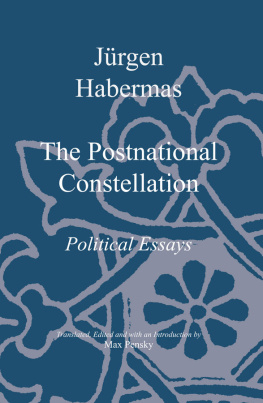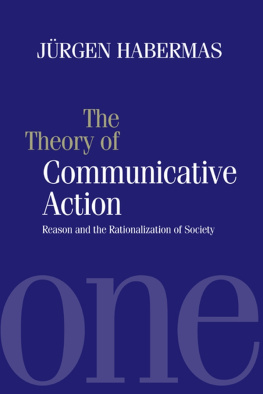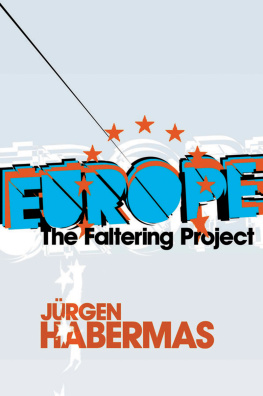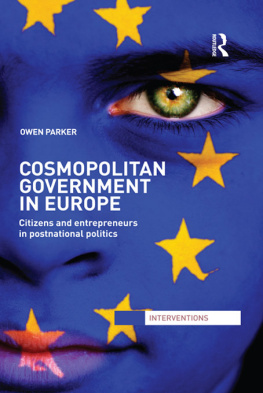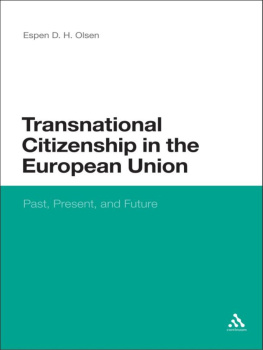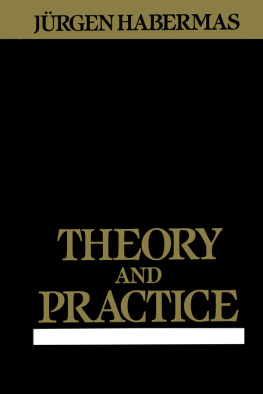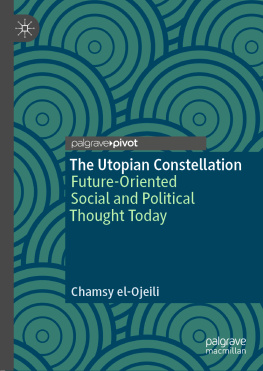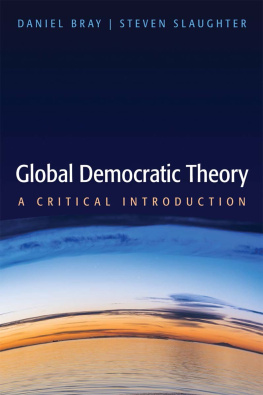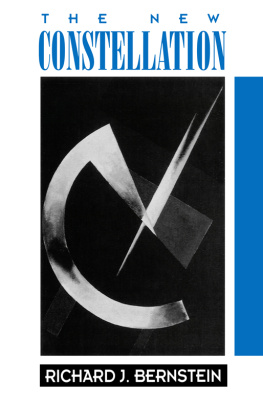
Contents
Copyright this translation Polity Press 2001. First published in Germany as Die postnationale Konstellation: Politische Essays Suhrkamp Verlag, Frankfurt am Main 1998.
First published in 2001 by Polity Press in association with Blackwell
Publishers Ltd
Editorial office:
Polity Press
65 Bridge Street
Cambridge CB2 1UR, UK
Marketing and production:
Blackwell Publishers Ltd
108 Cowley Road
Oxford OX4 1JF, UK
All rights reserved. Except for the quotation of short passages for the purposes of criticism and review, no part of this publication may be reproduced, stored in a retrieval system, or transmitted, in any form or by any means, electronic, mechanical, photocopying, recording or otherwise, without the prior permission of the publisher.
Except in the United States of America, this book is sold subject to the condition that it shall not, by way of trade or otherwise, be lent, re-sold, hired out, or otherwise circulated without the publisher's prior consent in any form of binding or cover other than that in which it is published and without a similar condition including this condition being imposed on the subsequent purchaser.
ISBN 0745623514
ISBN 0745623522 (pbk)
A catalogue record for this book is available from the British Library.
Acknowledgements
The publishers wish to thank the following for permission to use copyright material:
Blatter Verlagsgesellschaft mbH, Bonn for Habermas, `How to Learn from History', translated by Max Pensky, Bltter fr detsche nd interntionle Politik 42 (1997), pp. 40816.
Modern Schoolman for Habermas, `Remarks on Legitimation through Human Rights', translated by William Rehg, Modern Schoolmn, 75:2 (1998).
Every effort has been made to trace the copyright holders but if any have been inadvertently overlooked the publishers will be pleased to make the necessary arrangement at the first opportunity.
Editor's Introduction
I
Globalization: the term has become indispensable and unavoidable for a spectrum of current debates from political economy and democracy, law and human rights to cultural controversies over identity and difference. It seems to be a term destined to provoke only ambiguous reactions. On the one hand, globalization evokes the image of proliferating interconnections and interrelationship, of better communication between the most far-flung regions of the world, challenging old prejudices and pointing toward a future where the cultural, geographical, and political sources of social conflicts have become antiques. On the other hand, it calls forth panictinged images of global markets running out of control, of an unguided and uncontrollable acceleration of modernization processes, devastating the political infrastructures of nationstates and leaving them increasingly unable to manage their economies and the social and ecological crises they generate. On the one hand, globalization hints at the utopian vision of once-hostile strangers coming into peaceable contact through globalized media of all kinds; on the other hand, it hints at the dystopian specter of forced cultural homogenization either by the decrees of a centralized administration or by market fiat for developing countries, the eradication of the sources of any cultural identities unconducive to the mandatory, marketdriven adaptation to Western-style modes of life, to be replaced only by the bland Americanization of a global consumer culture; for Europe, a bureaucratically imposed, standardized Euroculture offered as the regulatory compensation for obsolete national characters, which live on only in the pallid form of commodities for mass tourism. Finally, perhaps the most glaring and disturbing either/or: globalization as the last, mutedly triumphant stage in the halting and frequently derailed process of global political democratization that began with the revolutionary introduction of the principles of popular sovereignty at the end of the eighteenth century globalization, in other words, as a staggering (in both senses) crossing of the finish line that also makes a bit more plausible the hope that a global democracy could be institutionalized with sufficient strength and sensitivity that global crises of war, injustice and inequity, and ecological devastation could become themes for a worldwide democratic process. Or: globalization as that market-driven homogenizing, dominating force that reveals precisely how thin the basis of legitimacy for democratic processes actually is within the current constellation of nation-states; globalization as the end of democratization not as its culmination but as the defining feature of the historical epoch marking the end of the national-state model for the institution of democracy. Thus globalization pointing (maybe not all that dimly) toward a future where global political and social decisions rest on the only structures capable of accommodating their complexity: highly evolved administrative state mechanisms, and highly dynamic and flexible markets, both of which operate much more efficiently by regarding their populations as clients or customers, and largely dispense with the direct participation of citizens. Mustering these conflicting images, fears, and hopes is not so difficult. Finding a way to sort them out, to confront their ambiguity squarely, and to shed some explanatory light on them to analyze them as challenges, rather than as overwhelming fate is not so easy. But this is the taskthat Jrgen Habermas sets for himself in The Postntionl Constelltion.
Since the middle of the twentieth century, Jrgen Habermas has been among the most vocal and influential advocates for an unashamed universalism in political and moral questions. His sprawling theoretical work, from his theory of rationality, through a theory of discourse ethics to a theory of law and democracy, is unified by the simple (and correspondingly ambitious) taskof demonstrating that the range of universalistic intuitions in morality, politics, and law the heritage of the eighteenth-century Enlightenment is no mere projection of power or local preference. Instead, Habermas argues that universality is embedded in the most basic capacities that we possess as persons capable of speaking, hearing, giving and accepting reasons for our actions, and conducting our lives correspondingly. In the most fundamental and distinctive human capacity the ability to speakto one another, to decide on the basis of reasons and arguments, to distinguish between understanding and deception Habermas insists we find a universal, if modest, basis for the great political innovations of popular sovereignty, legally enforceable human rights, democratic procedures, and the inconspicuous but vital solidarity that binds humans together, and makes them accountable to one another, through the mutual recognition of the status of personhood. The central claim of Habermas's theories is that the institutions based on the communicative use of human reason, from our moral intuitions to the institutions of the democratic constitutional state under the rule of law, are reasonable, and not merely the contingent consequences of historical circumstances.
Given Habermas's theoretical commitment to this claim to universality, one might have expected his frequent political interventions to carry on, in concrete terms, his larger theoretical ambitions, and indeed any reader familiar with Habermas's theoretical workwill find in the essays collected in The Postntionl Constelltion a clear relation to the theoretical defense of universalism. But to Habermas's credit and no other fact speaks more forcefully to the current relevance and ongoing importance of Habermas's workas a public intellectual his theory is never simply imposed on his occasional writings; indeed, for a prodigious theorywriter, Habermas has never fallen into the trap of making the facts fit the theory. While intimately involved with his theoretical ambitions, Habermas's political writings carry on a noticeably tense relation with them. Political developments certainly can and often do disappoint universalist expectations, and in this sense a universalist position in politics and morality can at the very least provide a vocabulary to make clear why the costs of globalization missed opportunities for popular political participation, for example, or exacerbated social inequities, or the loss of culture can be registered as costs in a normative, and not merely in a value-neutral, sense. In their complexity and persistence, however, political and social crises also challenge the theoretical position itself, urging the theoretical clarification of our universalistic normative intuitions toward a heightened degree of self-criticism, openness, and flexibility.
Next page
